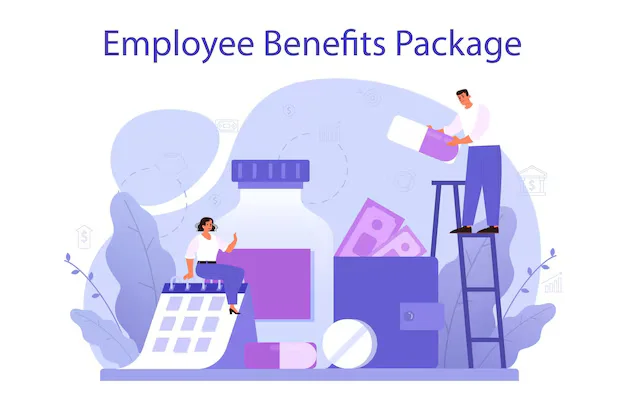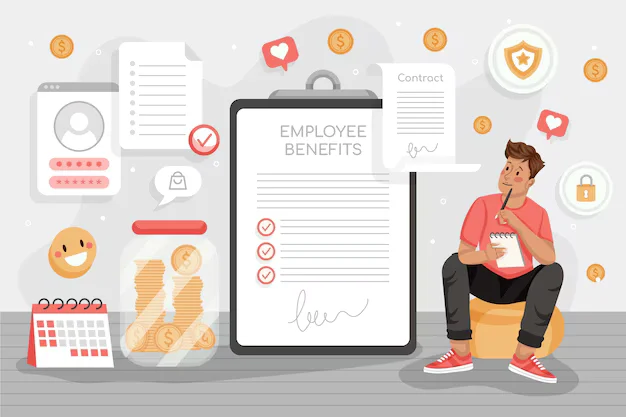How To Create An Employee Compensation Plan

As a business owner, you know that compensation is one of the most important things to consider when hiring new employees. Although it may not always be easy to create, having a good compensation plan that is mutually beneficial for the company and its workers is always worth the effort. Let's discuss how to create an employee compensation plan.
What Is a Compensation Plan?
A compensation plan provides detailed information about the salary ranges, fringe benefits, retirement savings plan, and compensation policies that underpin the terms and conditions of employment for current and prospective employees.
This plan elaborates on bonus payments, variable pay, commission-based compensation, and other employee benefits that employees receive as part of their compensation packages. Additionally, compensation plans outline planned raises and salary increments based on job performance and years of service, emphasizing pay equity and retention efforts within the competitive compensation plan.
An organization's policy on employee benefits and remuneration is articulated in a formal document known as a compensation plan, integral to compensation planning and aligning with company values. Depending on an organization's compensation philosophy and the state of the market, compensation plans differ from one to the next.
In the absence of a compensation plan, a corporation lacks a structured framework to pay employees, create pay grades, and establish pay practices that support business strategy and company performance. Ad hoc remuneration methods, without structured compensation policies, are likely to lead to substantial staff turnover, undermining efforts to retain talent and stay competitive.
Ultimately, a compensation plan harmonizes business strategy, corporate guidelines, and performance management systems that direct the development and distribution of rewards to attract and retain highly qualified employees.
What kinds of compensation programs are there?

Salary, hourly, and commission-based pay plans are the most prevalent forms of compensation plans:
Salary
No matter how many hours are done, an employee receives a fixed amount as salary or annual salary as part of their total compensation, covering all job duties within the agreed salary range. A salaried employee receives a regular income as well as additional perks including paid time off, bonuses, health insurance, disability insurance, and long term disability insurance, enhancing their employee satisfaction and base pay. Some employers also reimburse salaried workers for overtime hours worked, reflecting an indirect form of compensation that supports company equipment use and relocation stipends.
Hourly
An employee who receives hourly compensation is compensated at a set hourly pay rate for each hour performed, which is carefully monitored through job analysis to ensure pay employees accurately. When they work more than 40 hours a week, hourly employees are also paid overtime, impacting gross margins and sales volume through increased hourly wages.
Hourly employees must use timecards or an automated tracking system to record their flexible work hours, ensuring accuracy in the compensation package template and total compensation calculations. Hourly employees, often known as non-exempt workers, are paid less per hour than the minimum weekly wage. Additionally, they are not eligible for the perks provided by salaried employees.
Commission-based
Employees who work on a commission basis are paid in accordance with the number of sales and revenue they produce over the course of a given pay period, such as a month or a quarter. Additionally, some businesses guarantee a base pay income for commission employees regardless of their employee or company performance, ensuring a stable salary structure and access to medical insurance.
Some employees may receive bonuses in addition to base pay and commissions as non-financial compensation for excellent employee or company performance, helping to retain employees and enhance employee satisfaction.
Determine The Goal of Your Compensation Plan

The first step to create a compensation plan is determining your goal, whether it’s balancing profitability by adjusting gross margins or improving employee satisfaction and morale by enhancing total compensation. For plans that gear towards balancing profitability, the key is to create a program that will help your business operate more efficiently and generate profit with each transaction made.
For compensation plans geared towards improving employee morale, the key is recognizing employees for their hard work. Establishing the incentive philosophy and strategy your organization wants to use as a first step in building a pay plan.
The fundamental idea behind the compensation strategy is called a compensation philosophy, which integrates all the components of compensation package templates, salary structures, and relocation stipends to support strategic job analysis and planning.
The business operations, competitive advantage, and strategic initiatives of the firm are all supported by a sound pay philosophy. The concept serves as the foundation for all choices regarding employee compensation, incentives, and benefits. A solid philosophy takes care of the following:
-
Who will receive compensation?
-
Which form of compensation scheme is ideal for your staff
-
The justifications for employee compensation
-
The legitimacy of the pay scheme
-
Whether or not the remuneration structure is fair, reasonable, and defended in light of the budget
Understand Your Employees’ Needs
The compensation plan that you create should take into account the needs of your employees. These might include a sense of accomplishment at work, good relationships with coworkers, recognition for their hard work, or flexible schedules.
Taking care of employees' needs is one of the most crucial and dream jobs in developing a high-performance culture. Employees respond with high levels of engagement and commitment when their needs are addressed and they believe that the organization's goal, vision, and values are shared by them.
They have a positive attitude when they arrive at work and are prepared to go above and beyond to aid the company in its goals. So it's crucial to answer the question: What can firms do to develop highly motivated workforces where people are eager to contribute a sizable portion of their spare time, commitment, and originality to the success of the company?
Use A Competitive Wage as an Incentive
One job of compensation management is to make sure compensation rates are at a competitive level. Setting compensation too low may lead to shortages in the ranks of qualified workers, while setting it excessively high may result in an atmosphere that discourages self-improvement and learning.
The best approach for most employers is to offer pay packages with incentives for productivity and self-improvement. The compensation manager should also consider using pay stubs and invoices to track how much an employee makes concerning their work hours and achievements.
Provide Benefits to Keep Employees Healthy and On-The-Job Longer

The compensation plan should provide benefits that keep employees healthy and, on the job, longer. You can do this by providing medical coverage or incentives like health rewards cards that encourage better habits or other initiatives that inspire a healthy work and life balance.
Probably from personal experience, you are more productive when you feel better. Therefore, benefits - especially health benefits - can be helpful if you desire a more productive employee. For instance, if you provide dental insurance, a little cavity can never turn into a difficult root canal that requires your employee to miss several days of work and is a distraction.
Medical and vision insurance both have this characteristic. Similar principles apply to paid sick time. Encourage employees to stay at home when they are ill to avoid spreading illness to the rest of the team. Wouldn't you prefer to have one absent employee than twelve?
Additionally, sick leave enables your employees to concentrate on recovering and improving. Instead of having to work through illness for days or even weeks, an employee can take a day or two off and return rested and ready to go. The premise is that happier workers can result in a happier company. Offering health insurance and other wellness perks is a smart business decision.
Offer Perks Like an Employee Lounge or Free Food
To keep employees happy, they must enjoy their time at work. Providing an employee lounge with comfortable furniture and free food always goes a long way in making them feel appreciated. It also helps when you consider the increased productivity and reduced turnover rates of companies that offer these types of perks.
Why Do Companies Need a Compensation Plan?
A compensation plan is a vital component of the employer-employee relationship. The best way for businesses to remain competitive is to create a compensation program that attracts and retains top talent.
In the long run, a company that pays its employees whatever amount it deems appropriate will lose ground to its competitors. Moreover, managing a workforce without a budget is absurd. By implementing compensation programs, budgeting and planning can be consistent and predictable.
Final Thoughts
It is important to remember that compensation plans are not one size fits all. What works for one company may not work well for another, so it's essential to customize a plan that makes sense in the context of your industry and organization.
Once you have identified the factors that make up an effective compensation plan, you can develop ideas on how best to address them before finalizing your salary structure. In line with this, you can now easily generate pay stubs, W-2 forms, and other financial documents.

